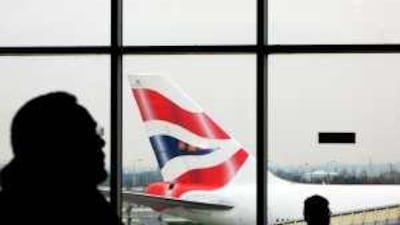DUBAI // British Airways (BA), the UK's flagship carrier, has increased its summer flight schedule to the GCC region by 35 per cent to try to compensate for shrinking passenger numbers worldwide. The airline would also resume flights to Riyadh and Jeddah in Saudi Arabia on May 31 after a four-year absence, Paolo De Renzis, BA's new commercial manager for the Middle East, said today.
In its biggest-ever summer schedule to the region, BA will operate 66 weekly flights from London Heathrow to eight GCC destinations, a 35 per cent increase compared with its summer schedule last year. The increase comes at a time when most regional and global carriers are suspending route expansion plans to cut costs and compensate for shrinking passenger numbers. "The Middle East still remains a growth market for BA," said Mr De Renzis. "It is one market where we are expanding instead of cutting capacity.
"There is a lot of competition in the market and, like everyone else, we are looking at various means of controlling costs." But Mr De Renzis said this did not mean the airline would shed jobs in the region. "In fact, we are hiring more people for our Saudi operations." Germany's flagship carrier, Lufthansa, last week also announced an increase in numbers of flights to the Middle East, saying it would divert aircraft from weakening markets in North America and East Asia and would use them on Middle East and Africa routes where demand was higher.
The airline said seating capacity would rise 110 per cent this summer on flights to the UAE, while the Gulf region would see a 40 per cent growth in overall capacity. Tough economic conditions and a significant fall in passenger and cargo revenues across continents has forced many international carriers to retrench staff. BA has made a third of its management team redundant to minimise operational costs and has been reducing capacity from loss-making destinations such as Harare in Zimbabwe, and Japan, and diverting resources to markets such as the Middle East and India.
"It is no secret the aviation industry is in the worst trading environment it has ever faced. Several carriers have folded already this year, following the 30-plus airlines that went bust in 2008," Mr De Renzis said. BA, which has reviewed fuel surcharges twice in the past six months, said there were no plans of a further review in the near future. Mr De Renzis said BA had hedged 50 per cent of its fuel requirements for this year at oil price levels towards the end of last year. This, he said, increased the airline's chance of weathering the economic downturn more effectively.
"Fuel is our biggest cost, which amounts to £3 billion (Dh15.97bn)," he said, adding the airline's aim was to consolidate in markets such as the Middle East. British Airways, Mr De Renzis said, had flown more than 370,000 passengers to its dedicated Terminal Five in London, which has seen traffic of 20 million in one year of operations. "The feedback is excellent and we intend to capitalise on that," he said.
Asked about the airline's merger talks with Spain's Iberia, which would create the third-largest airline in Europe, Mr De Renzis said the deal could be finalised in the coming weeks. "This [merger deal] will result in a restructuring of BA and Iberia operations, however, it will not affect the BA Middle East operations." BA and Iberia have been in merger talks since July last year. @Email:skhan@thenational.ae


